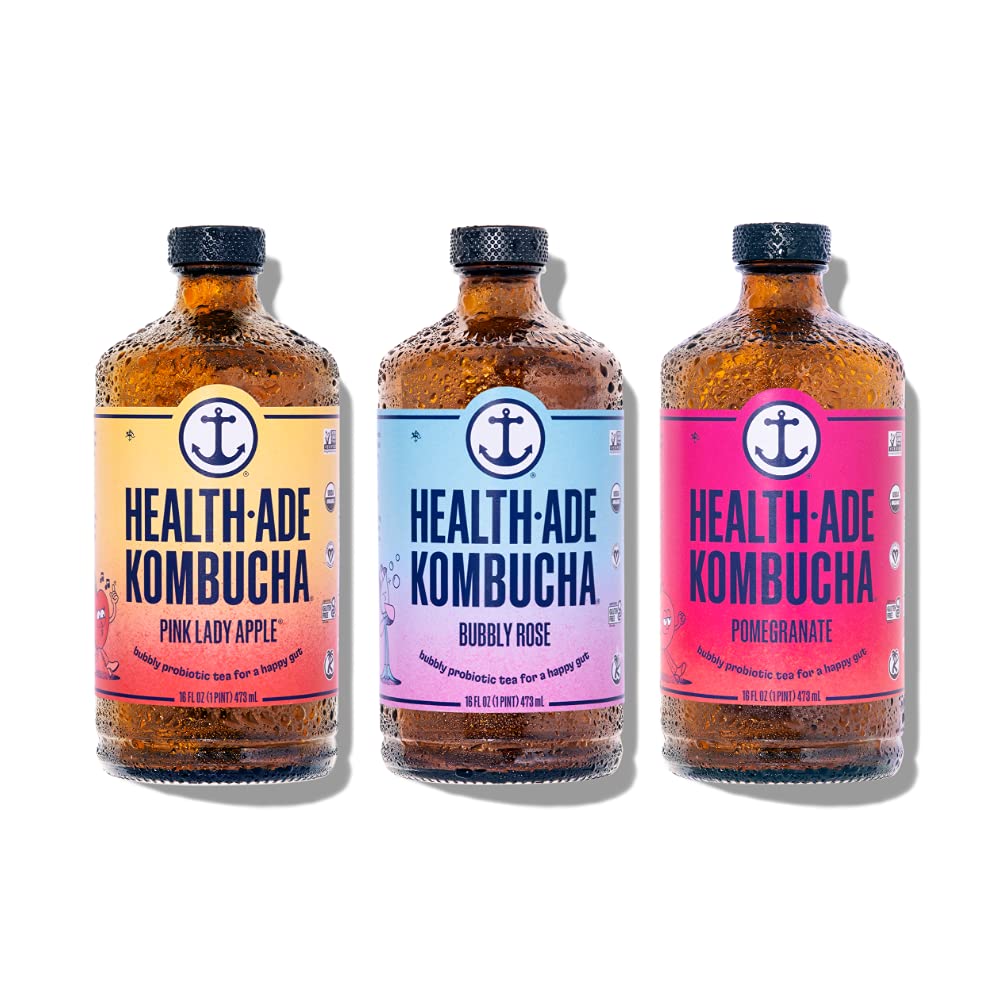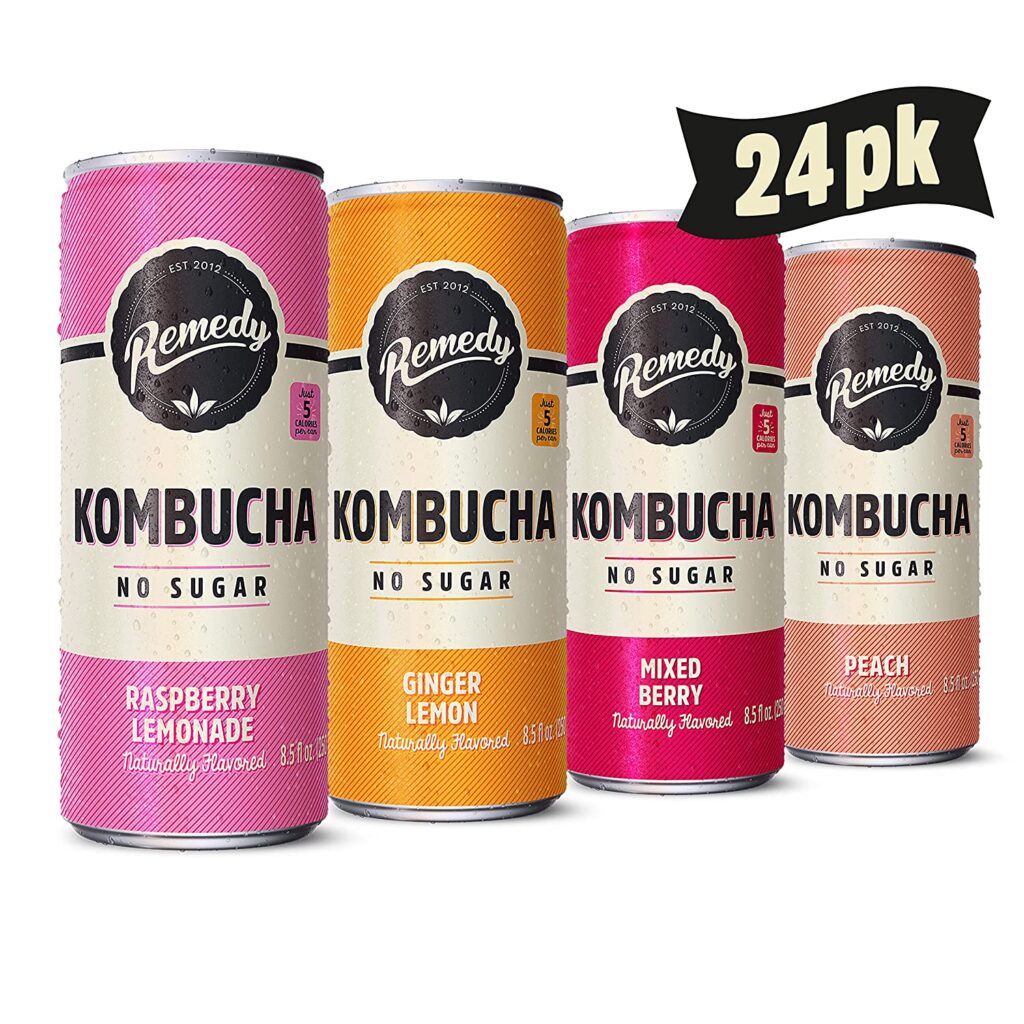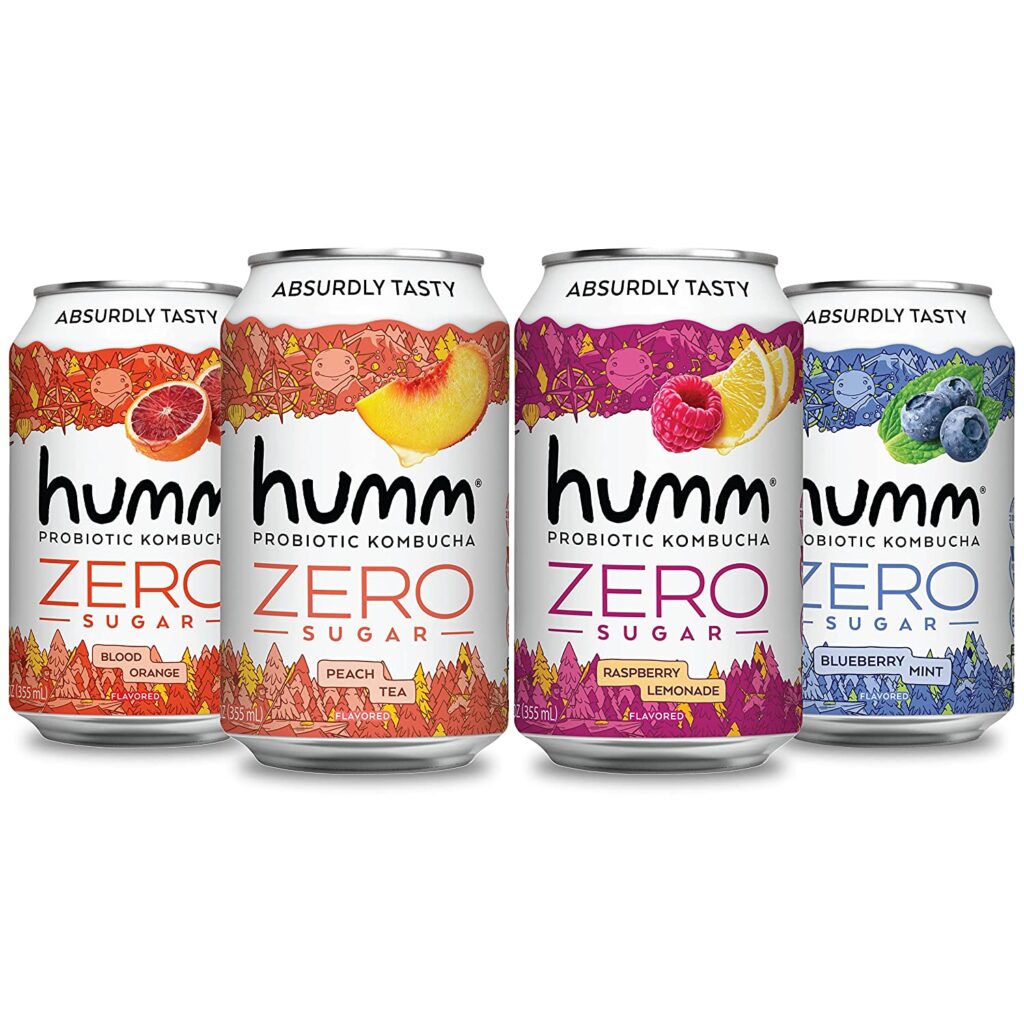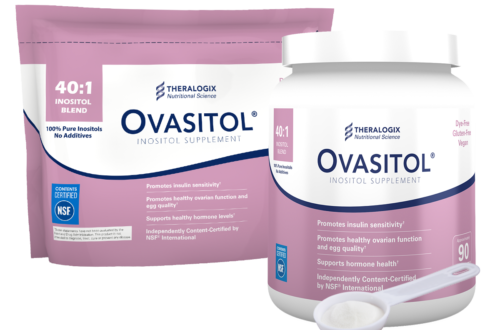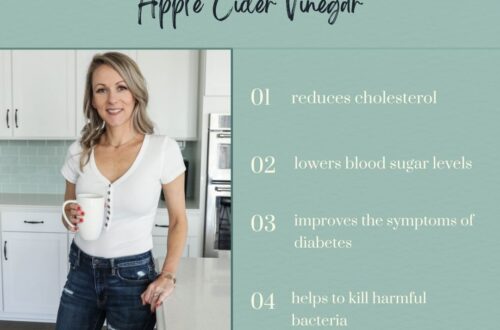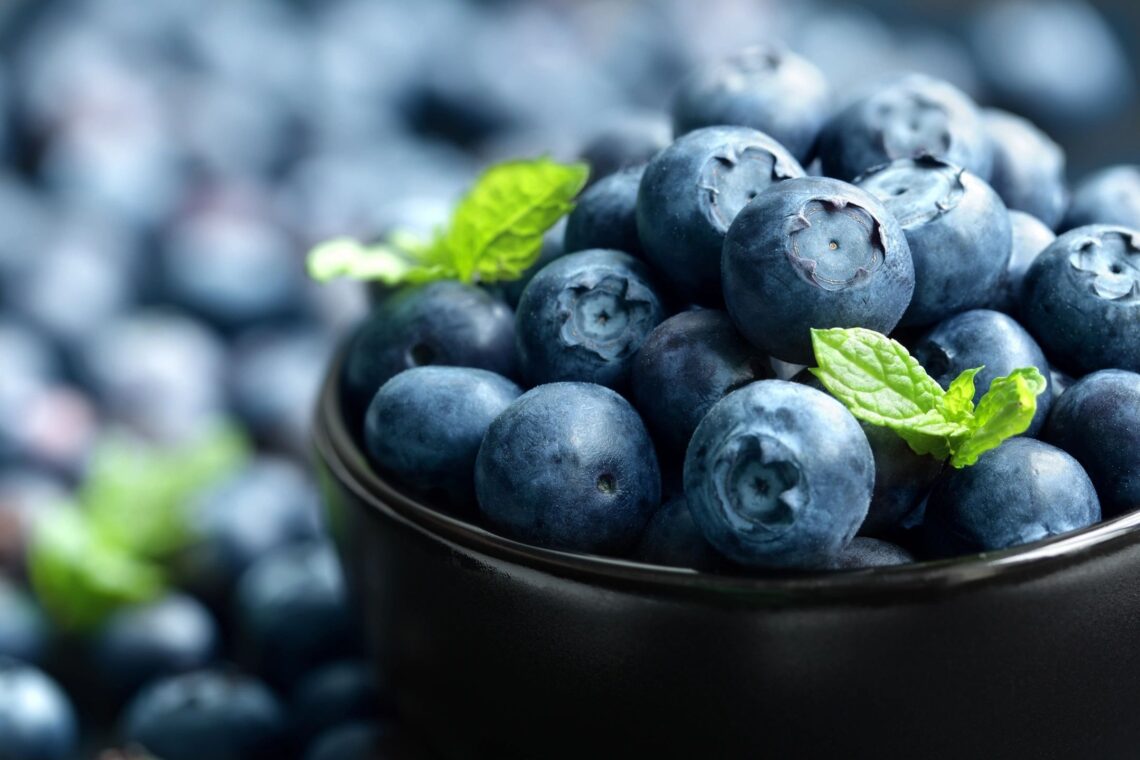
Inflammation and Fertility
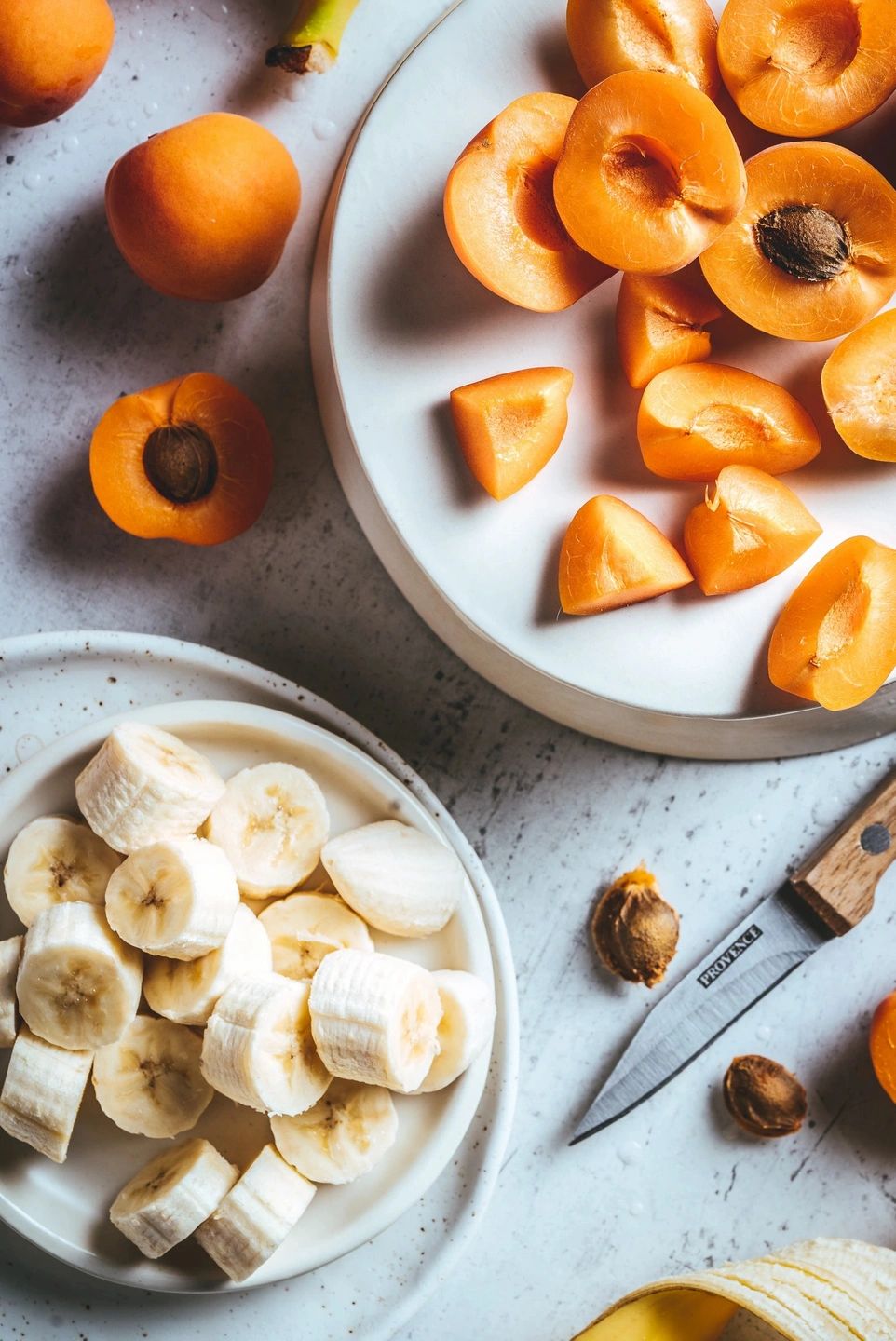
The female body is amazing. We are creatures of resilience. Of elegance. Of beauty. We carry life, birth life, and provide nutrients for life…all while working full time jobs, running households, and hitting the gym. Literally, we are astonishing.
The immune system of a woman also deserves a lot of attention. When you really think about it, our reproductive system has an incomparable capacity to resolve inflammation. Each mensural cycle, we clear tissue and waste and then quickly regenerates back to base-line. Only to do it over and over again.
So, lets break down inflammation. There are 2 forms of inflammation – acute and chronic. Acute inflammation is just that, a quick addition of blood flow to the damaged area to promote healing. It is characterized by the presence of white blood cells and phagocytes (immune cells that clear the inflamed area.) Acute inflammation is a natural part of many reproductive process. Hormonal changes resulting in egg maturation, ovulation, and endometrial lining changes all have a normal inflammatory component.
Chronic inflammation on the other hand, results when the acute immune response remains active. Chronic inflammation can disrupt ovulation, hormone balance, and implantation. Conditions like Polycystic Ovarian Syndrome (PCOS), endometriosis, early menopause, uterine fibroids, ovarian cysts, poor sperm and egg quality, and premature ovarian failure have all been linked to chronic inflammation and adverse pregnancy outcomes. Inflammation is also likely to be associated with other prominent aspects of PCOS including insulin resistance, endothelial dysfunction, and cardiovascular disease (CVD) risk factors. (1)
As a woman battling PCOS, I am no stranger to chronic inflammation reaping havoc in the body. I can still remember being diagnosed. The OB told me “you will never have children naturally.” I cried. Oh, did I cry. And then…I researched. I read anything and everything there was to read about PCOS. It became my life.
Because of PCOS, I battled years of painful infertility treatment. (You can read more about my journey here) I found myself alienating fertile friends, avoiding events with children and young families, and feeling overcome with anxiety. Having the knowledge and motivation to combat PCOS’s inflammatory properties is how I survived this life-changing syndrome. Honestly, any reproductive concerns that incorporates excess pain suggests the body is experiencing a large amount of inflammation and needs to be addressed personally, medically and/or holistically.
Recently, inflammation has been heavily studied as a fertility challenge because inflammation is a very complex biological response of vascular tissue to a harmful stimuli. Basically, it means the body is reacting to an irritation, infection, or injury.
One of the most important markers of inflammation is C-reactive protein (CRP). CRP is an acute-phase reactant produced by hepatocytes under the stimulatory control of pro-inflammatory cytokines such as interleukin (IL)-6 and tumor necrosis factor α (TNFα) (2). Growing evidence supports the concept that CRP may not be the only marker, but also a mediator of inflammatory processes (3,4). Investigators at The Center for Human Reproduction, under the leadership of David H. Barad, recently completed a study which demonstrated inflammatory blood markers, CRP and IL-6, had statistically highly significant predictability if elevated with diminished IVF outcomes (pregnancy and live birth rates) and increased miscarriage risk.
Natural Treatments
Inflammation is both triggered and worsened by stress, lifestyle and diet. If you’re looking to begin the healing process, holistic and natural therapies are great starting point. Here are a few ideas:

Just Relax! (Which is literally the WORST thing you can ever say to an infertile woman). But sadly, it’s true. Chronic stress stimulates the inflammatory response. Try incorporating therapies like yoga, fertility massage, meditation, acupuncture, mind-body programs, nightly baths, aromatherapy, journaling or anything that resonates with you, to reduce stressors in your life.
Consume more fresh and raw fruits and vegetables. Fresh fruit and veggies are high in antioxidants and food enzymes, which act as natural anti-inflammatories. Their antioxidants help quench free radicals which run rapid in inflamed bodies. Fresh foods are also alkalizing and detoxifying, helping to remove chemicals like uric acid.
| Nutrient | Dose (Daily) | Benefits | Food Source |
| Vitamin C | 1000 mg | Decrease overall chronic pain, menstrual pain, & pain with intercourse Increase serum and follicular fluid in women undergoing IVF-embryo | citrus fruits, tomatoes, kiwi, & bell peppers |
| Vitamin D | 4000 IU | Decrease pelvic pain and LDL’s & increase HDL’s | mushrooms, beef liver, tuna |
| Vitamin E | 1200 IU | Decrease chronic pain, menstrual pain & pain with intercourse | blueberries, almonds, hazelnuts, avocados, spinach, olive oil |
| Omega-3 | 1000mg | Decrease menstral pain and inflammation | mackerel, sardines, salmon, avocados |
Resveratrol | 30mg | Increasing mitochondrial support, estrogen clearance, and free radical scavenging | blueberries, cranberries, grapes, blackberries |
Eat More Fat! Yep…I said it…EAT. FAT. Now, hear me out…
The body needs a healthy balance of Omega-6 and Omega-3 fatty acids for multiple reasons such as reproductive health, blood clotting, blood pressure control, and immune function. Excess consumption of Omega-6’s can trigger the body to produce pro-inflammatory chemicals potentially leading to chronic inflammatory diseases. In general, Omega-6’s are pro-inflammatory while Omega-3’s are anti-inflammatory. (5)
Omega-6 fatty acids are found in plant oils such as sunflower, safflower, and corn oils, but they are also present in cereals, corn-fed animal fat, and wholegrain bread.
The fats I recommend eating are Eicosapentaenoic Acid (EPA), also know as Omega-3 Essential Fatty Acids. EPA is the lipid structure our body uses to make beneficial prostaglandins that reduce inflammation. You can read more in my post “Fats for Fertility”.
Rich dietary sources of Omega-3 fatty acids include cold water fish such as salmon, trout, herring, tuna, and cod, and green leafy vegetables, flaxseed, and rapeseed oils. Increase intake of monounsaturated fats from plant foods like avocado, nuts and seeds, and olive oil also help fight inflammation and nourish the reproductive system. If you feel as though you are not eating enough Omega-3’s, you can always supplement.
Pure, sustainable, high-quality – three words you want to see when looking for an omega-3 fish oil supplement. Rich in EPA and DHA, TherOmega is formulated to help support eye, immune, joint, and heart health. Use “133626” for the discount.
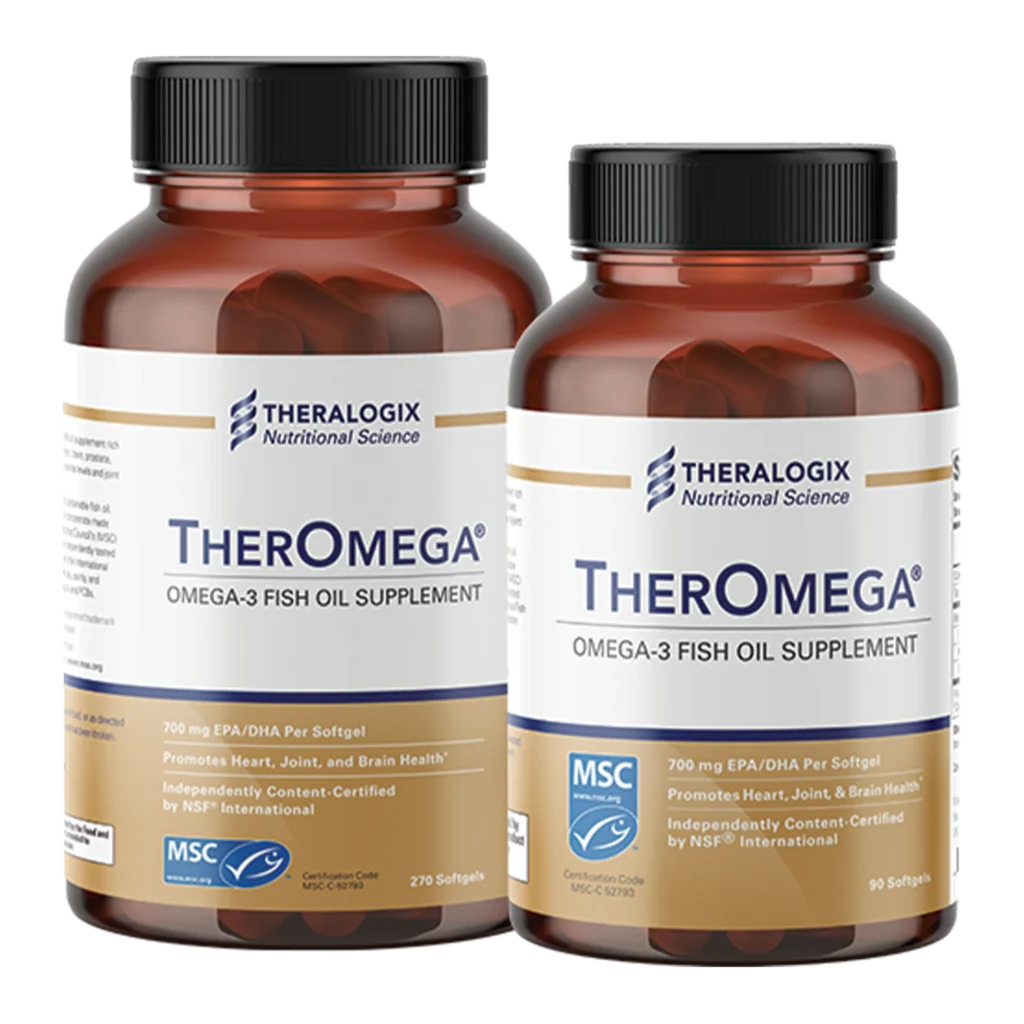
Optimal dietary intakes of the Omega-6’s and Omega-3’s ratio should be around 1:4 (6).
Increase Fiber and Pre & Probiotic Consumption: Kombucha, unprocessed whole grains, legumes, and beans help to regulate insulin levels, metabolize excess estrogen, and pull inflammatory toxins out of the body.
Kick Gluten to the Curb! Gluten is a protein found in grains. It’s common in foods such as bread, pasta, pizza, and cereal. Gluten provides no essential nutrients. People who are sensitive to gluten can have symptoms anywhere in the body when partially digested gluten fragments leak from the intestine into the bloodstream. Unlike other proteins, gluten is not completely digested. In some people, the immune system sees gluten as the enemy and will unleash compounds to attack it, causing inflammation in the intestines as well as other organs and tissues.
Daily Turmeric (curcumin): Turmeric contains curcumin, which is widely studied for its therapeutic effects on IL-6, CRP, and TNF-α. One particular study published by the Journal of Reproductive Infertility studied 72 female rats with outcomes showing that the anti-inflammatory and antioxidant effects of curcumin on PCOS may be due to its inhibitory effect on expression and levels of TNF-α, serum IL-6 and CRP. (7) Take turmeric or curcumin with a meal containing fats (they’re fat soluble) and be sure to include black pepper extract to boost its absorbability and bioavailability.
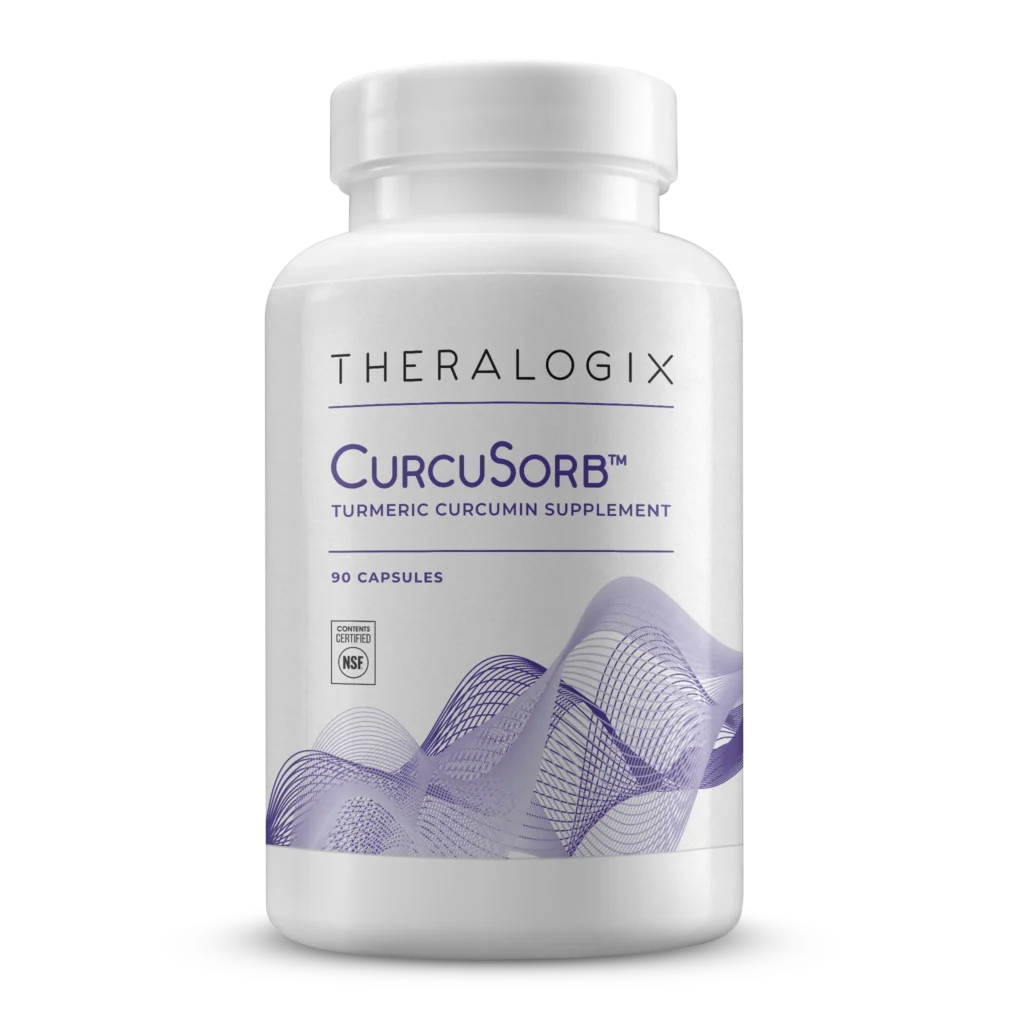
Additionally, turmeric and curcumin may promote healthy blood sugar and insulin levels, as well as support joint and heart health, and promote healthy aging. There’s one problem. Curcuminoids are not easy for your body to absorb naturally. CurcuSorb overcomes this problem with its highly bioavailable turmeric complex that ensures optimal absorption of the beneficial curcuminoids found in turmeric. Use “133626” for the discount.
Proteolytic Enzymes: Enzymes like trypin, rutin, bromelain, papain, pancreatin, and chymotrypsin are thought to help break down the chemicals involved in inflammation.
Endometriosis and Inflammation
Endometriosis is a well known estrogen-dependent, inflammatory disorder, impacting 10%-15% of women of reproductive age. This condition is characterized by the presence of endometrium — the tissue that encloses the uterine cavity — outside the uterine cavity and capable of invading beyond the pelvic cavity (1). Despite its prevalence, the cause of endometriosis is strangely unknown. A 2017 review of studies looking into the origins of endometriosis hypothesizes that it is based on three main theories (3):
- Retrograde menstruation: When your period flows up through your fallopian tubes rather than exiting via your vagina
- Induction: When unknown substances are released from the layer of tissue that lines the uterus, leading to the growth of endometriotic tissue
- Coelomic metaplasia: When endometriosis develops directly on the affected regions from cells already found in these areas (this can occur in your ovaries, bladder, bowel, abdomen, etc.)
There is no cure for endometriosis and current treatment options are limited but tolerable. I have outlined a few natural ways to help with endometriosis:
Natural Treatment of Endometriosis
The following natural treatments work because they improve immune function and reduce inflammation. They can be tried on their own but sometimes they are not enough on their own. Natural treatments can work best when they are used as an adjunctive treatment after surgery.
Avoid Gluten: As mentioned above, gluten disrupt immune function and stimulate the release of inflammatory cytokines. In a recent study, 75 percent of endometriosis sufferers improved after 12 months on a gluten-free diet. Many endometriosis-sufferers also report they feel better off eggs because of a possible immune reaction to egg proteins.
Berberine: is anti-inflammatory and repairs intestinal permeability (thereby improving immune function). It’s also anti-microbial and potentially addresses the bacterial aspect of endometriosis by neutralizing the bacterial toxin LPS. Caution: Do not take berberine if you are pregnant or breastfeeding, and do not take it for more than three months continuously except under supervision. Be cautious when combining with other medications.
N-acetyl cysteine (NAC): is a natural anti-inflammatory that did well in a recent clinical trial for endometriosis. Of the 47 women in the NAC treatment group, 24 cancelled their laparoscopy due to a disappearance of endometriomas, reduction of pain, or pregnancy.
Zinc: is a key anti-inflammatory nutrient that is commonly deficient in women with endometriosis. Zinc repairs intestinal permeability (thereby improving autoimmunity) but should only be taken for 10 days unless labs indicate deficiency.
Other helpful treatments include selenium, rosemary, resveratrol, castor oil packs, and body-identical progesterone
Conclusion
Typical acute inflammation is a necessary component for cellular repair during ovulation, menstruation, implantation, and birth. While acute inflammation helps repair your body, chronic inflammation is detrimental to homeostasis and is known to be the root cause of a variety of imbalances in the body.
You can reverse the damaging effects of inflammation on the reproductive system just by making healthier lifestyle choices. Limit alcohol, caffeine, and/or smoking and by eating clean and colorful. An inflammatory response can also be triggered by physical, mental, and emotional stress. Take a step back and focus on yourself if you have to. Inflammation reduction will not only help your reproductive system, it will help promote a healthier mind, body, and soul for you AND your future baby.
Just remember, your path may be a different one, a slower one, but are on it and your goals can be reached.
References
1. Ross R. Atherosclerosis–an inflammatory disease. N Engl J Med. 1999;340:115–26
2. Ross R. Atherosclerosis–an inflammatory disease. N Engl J Med. 1999;340:115‑262. Castell JV, Gomez-Lechon MJ, David M, Andus T, Geiger T, Trullenque R, et al. Interleukin-6 is the major regulator of acute phase protein synthesis in adult human hepatocytes. FEBS Lett. 1989;242:237–9
3. Han KH, Hong KH, Park JH, Ko J, Kang DH, Choi KJ, et al. C-reactive protein promotes monocyte chemoattractant protein-1–mediated chemotaxis through upregulating CC chemokine receptor 2 expression in human monocytes. Circulation. 2004;109:2566–71
4. Venugopal SK, Devaraj S, Jialal I. Effect of C-reactive protein on vascular cells: evidence for a proinflammatory, proatherogenic role. Curr Opin Nephrol Hypertens. 2005;14:33–7
5. E. Patterson, R. Wall, G. F. Fitzgerald, R. P. Ross, and C. Stanton. Health Implications of High Dietary Omega-6 Polyunsaturated Fatty Acids. J Nutr Metab. 2012; 2012: 539426
6. Calder PC. Polyunsaturated fatty acids, inflammatory processes and inflammatory bowel diseases. Molecular Nutrition and Food Research. 2008;52(8):885–897
7. S. Mohammadi, P. Kayedpoor, L. Karimzadeh-Bardei, and M. Nabiuni. The Effect of Curcumin on TNF-α, IL-6 and CRP Expression in a Model of Polycystic Ovary Syndrome as an Inflammation State. J Reprod Infertil. 2017 Oct-Dec; 18(4): 352–360


